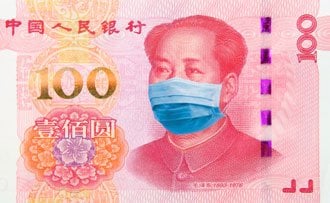If you're spooked the new coronavirus could cause a stock market crash, you aren't alone. The Dow Jones started this week 400 points in the red as the outbreak continues to spread.

But a jittery few days doesn't mean a stock market crash is coming.
It also doesn't mean there's no danger.
By planning ahead, you're in the right spot. We're going to dig into why the coronavirus is hurting stocks; plus, we'll take a look at what past outbreaks did to stocks so you'll be fully prepared for what happens next.
As always, our goal is to help you make money, and crises like these don't just create risks - they create opportunities too...
Why the Coronavirus Is Hurting Stocks This Week
Wall Street hates uncertainty. A deadly, incurable virus spreading rapidly creates a lot of uncertainty.
Over 3,000 cases have already been reported in China, and it's widely speculated the government is downplaying the true number.
Wuhan, Chinese city at the center of the outbreak, is being quarantined, and makeshift hospitals are being built to treat the potentially infected. Hundreds of flights in and out of Wuhan have been canceled.
China's productivity is suffering as more people come down with the virus and more cities have to be quarantined. That's a major reason stocks are falling.
With China being a manufacturing hub for some of the largest companies in the world, like Apple Inc. (NYSE: AAPL), a slowdown could hurt earnings. Apple fell 4% on Monday.
An even bigger risk to stocks is if the virus spreads across the world. Over 100 people are being treated for it in the United States already. So far, the outbreak appears contained in the U.S., but a pandemic could slow the economy and hurt stocks even more.
To get a sense of the potential damage at stake here, we can look at past outbreaks...
How Past Outbreaks Hurt Stocks
Previous outbreaks, from SARS in 2003 to H1N1 in 2009 to Ebola in 2014 created scares, but they didn't cause a stock market crash.
Stocks were hit the hardest during the Ebola scare, when they plunged 8% in October 2014. But the slowdown didn't last for long. The S&P 500 grew 4% between October 2014 and January 2015 as the bull market run continued.
The H1N1 outbreak, also known as the swine flu, didn't halt the stock market's recovery in 2009 either, even though 265,000 Americans were hospitalized for it. The S&P 500 posted a gain of nearly 10% between March and May that year, just as fears of an outbreak were peaking.
While the overall markets powered through previous crises, some stocks still fell into correction territory.
Airlines suffered the most during the Ebola outbreak, with American Airlines Group Inc. (NASDAQ: AAL) and Delta Air Lines Inc. (NYSE: DAL) both plunging over 20%. Both companies are suffering this time around too, with American Airlines down nearly 10% since Friday.
The same thing happened to pork producers during the swine flu outbreak in 2009. Shares of Smithfield Farms fell over 20% as pork prices cratered.
So far, stocks are only down 2.5% during the coronavirus scare, but history shows there's much higher risk for individual stocks tied to the pandemics. And if the virus spreads even more, the losses to the broader market could grow.
Here's what to do...
How to Protect Your Money from the Coronavirus
[mmpazkzone name="in-story" network="9794" site="307044" id="137008" type="4"]
Money Morning Chief Investment Strategist Keith Fitz-Gerald says a sell-off has been in the offing for about the last month. The virus fears have simply sparked the sell-off.
And it might not be as much of a sell-off as it is traders taking a "wait and see" approach, which is lowering bids for stocks.
That could create some buying opportunities once fears subside, but Keith says it's too early to move in.
Trying to buy low right now is like trying to catch a falling knife.
Keep an eye on the stocks on your wish list and see if they fall into a discounted range for when the crisis comes to an end. If you own a stock with exposure to China, now isn't the time to ignore your trailing stops and hope for a rally.
And if you're worried this outbreak might get a lot worse before it gets better, there's no better hedge than gold.
The SPDR Gold Trust ETF (NYSEArca: GLD), one of our favorite ways to invest in gold, is up 3.4% so far this year, and half of those gains came since Friday. Gold is historically a safe haven asset, so the more fears rise, the higher gold prices go.
Adding a gold position to your portfolio will add stability as markets react to the virus while giving you upside potential if things get worse.
That's just a start.
Keith has an even more detailed strategy on how to handle the next crisis. And it isn't just about protecting your cash; it's about turning a profit too.
If you lost out when the markets crashed in 2008, then you are going to want to see this special presentation...


